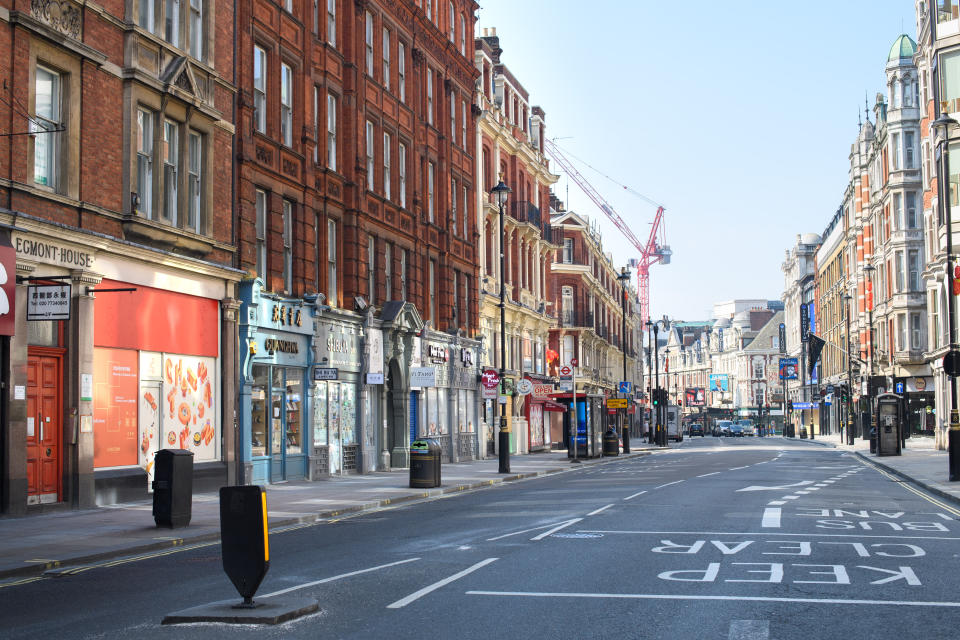What to watch: Hiscox rejects firms' insurance claims, markets climb, inflation slows

Here are the top business, market, and economic stories you should be watching today in the UK, Europe, and abroad:
Insurance giant Hiscox warns 10,000 firms cannot claim over UK lockdown
The insurance giant Hiscox (HSX.L) has warned around 10,000 businesses cannot claim for disruption caused by the UK government order to shut down their premises.
The company said it recognised customers faced “difficult times,” and said some firms had disputed its decision. It said it and was working with customers, regulators and the industry to “seek means of expediting resolution” to the unprecedented situation.
“Like others in the industry, Hiscox UK's core small commercial package policies do not provide cover for business interruption as a result of the general measures taken by the UK government in response to a pandemic,” it said.
But it said it expected to pay out claims of up to $150m for cancelled events, travel and other disruption if restrictions continue for six months from March. Another $25m could be paid out if restrictions last even longer.
UK inflation dropped just before COVID-19 hit
The UK inflation rate fell to 1.5% in March, reflecting the initial impact of the coronavirus pandemic on the country, according to the Office for National Statistics (ONS).
While the year-on-year rise in prices was slower than the 1.7% experienced in February, it does not take into account the lockdown imposed in the last week of the month, which came after the price survey was conducted.
The ONS said on Wednesday that the figure was still “likely” to have been influenced by the pandemic, noting that “consumer behaviours and retailers’ expectations of that behaviour might have changed as a result of social distancing and other precautions.”
Brent crude hits 21-year low as oil rout continues
The price of a barrel of brent crude hit its lowest level since June 1999 on Wednesday as the coronavirus pandemic continued to dent oil prices globally.
At $16.83 per barrel, brent crude (BZ=F) was trading almost 13% lower. Brent crude prices, which fell 24% on Tuesday, have now fallen by more than 50% over the last seven trading days.
Meanwhile, crude oil (CL=F), which hit historic lows on Monday, also fell on Wednesday 22 April. June West Texas Intermediate futures fell 7% to around $10.75 per barrel.
Analysts have warned that global oil storage capacity will quickly reach saturation point as the pandemic pushes demand for the commodity lower.
European markets rise on US stimulus package
European stocks climbed on Wednesday after the US senate passed a further $484bn coronavirus aid package that will bolster a small business loan programme and provide funding for hospitals and coronavirus testing.
The House of Representatives is on Thursday expected to pass the bill, which comes just weeks after US lawmakers passed an unprecedented $2.3tn coronavirus rescue package. Funding for the loan programme, which is designed to help struggling businesses stay afloat, was quickly depleted before many firms could even apply.
The pan-European STOXX 600 index (^STOXX) was up by around 0.8%. London’s FTSE 100 (^FTSE) climbed by more than 1%. Germany’s DAX (^GDAXI) was up by around 1%, while France’s CAC 40 (^FCHI) was almost 0.4% in the green.
The gains for Europe stocks followed a mixed trading session Asia. China’s SSE Composite Index (^SSEC) rose by 0.6% on Wednesday and the Hang Seng (^HSI) was up by more than 0.3% in Hong Kong at market close.
What to expect in the US
Futures were also pointing to a higher open for US stocks on Wednesday.
S&P 500 futures (ES=F) rose by around 0.9%, as did Dow Jones Industrial Average futures (YM=F). Nasdaq futures (NQ=F) were up by almost 1%.
